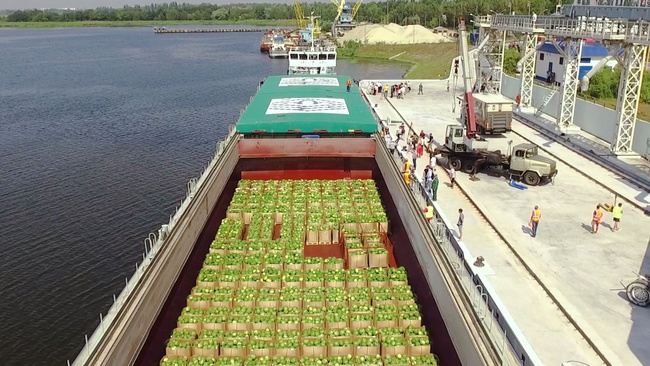Most of the companies growing watermelon in Ukraine are small enterprises with limited access to retail supermarket chains. Their produce is being sold at spot markets and not state certified. Absence of packaging standards and lack of cooperation between farmers make it impossible to enter retail stores. Moreover, during the high season demand for truck transport services dramatically increases, which drives up costs. Up to 30% of the harvest remains in the field due to the lack of adequate transportation in high season, and another 13% are damaged during truck transport on poor roads. The Dnipro River's infrastructure has deteriorated.
Applying a market systems approach the project identified systemic challenges in a sample supply chain, watermelon, in the Kherson region. Watermelon was selected due to its high demand across Ukraine during the summer months and the road transportation systemic issue because watermelon is particularly difficult to transport due to their bulk and potential for damage.
The project supported watermelon supply chain actors to work together to address shipping costs, perishability, and packaging standards, and design a new model of supplying watermelon from southern Ukraine to large trading networks using riverways. To test the model, partners (Sil’po, the largest supermarket chain based in Kyiv; Nibulon, a large agribusiness operating a significant cargo fleet on the Dnipro River; and 28 small- and medium-sized farms operating in Kherson) organized a test shipment from Kherson to a Nibulon terminal near Kyiv by barge via the Dnipro River.
On July 30, 2017, a barge loaded with 250 tons of watermelon harvested by farms in the region were shipped by Nibulon from the Hola Prystan river terminal to a river terminal near Kyiv, attracting the attention of the media and average citizens as Ukraine followed its progress as they remembered what a mighty resource the Dnipro had been.
According to conservative estimates from the Ministry of Infrastructure, moving 1 million tons of cargo from the roads to the rivers will save the country $31 million in road repair costs. Aside from river transportation being the cheapest mode for agricultural products, it will spark regional development along the river network, create jobs, and launch cargo and passenger shipbuilding. At least three foreign companies are prepared to invest in the river transport sector if the appropriate legal groundwork is put in place. In 2015, the Ministry of Infrastructure drafted and presented a series of bills to Ukraine’s parliament intended to jump-start river transport. The innovations in the bills include a single, small river tax; removal of all limitations on river logistics; and transparent competition rules. The Ukrainian Sea Port Administration recently repaired a series of passenger boats and docks, while the Ministry of Infrastructure held negotiations with the European Commission on including the Dnipro in the European Rivers Network and lobbying for cargo transport along the Dnipro-Black Sea-Danube route.
The Pilot was designed to test the hypothesis on economic efficiency of river transportation of big butches of products from Southern Ukraine. The test did not prove the hypothesis. Compared to road, the river transportation increased delivery terms from one to five days. The actual savings were around 8%, which is significantly lower than expected (25-30%). Savings would be even less during off-peak months.
Currently Kherson Oblast has no special loading equipment which significantly increases the time of loading and unloading barges. It took 48 hours to load the barge, which is twice longer than estimated. Thus, it took watermelons eight days "from the field to the counter" by river, while it takes one day for the same route by road. With 250-300 tons of watermelon, the barge was loaded by 15% thus making it economically unprofitable for the company. Nibulon considered the effort a "social project" or "free-of-charge project". Farmers have very little co-operation experience so working smoothly even with 250-300 tons was a challenge. We need to develop interaction skills and build up trust between players. However, there is high interest from those involved in the pilot as well as others. The project is looking at ways to help different system actors to address the issues identified in the pilot
Despite the fact that the pilot was not economically successful, it raised the issue of river logistics at the national level.
The pilot also received wide media coverage. After the Ukrainian Prime Minister excitedly announced on Facebook that a shipment of watermelons was traveling from the Kherson region to Kyiv for the first time in 14 years, funny versions of the enthusiastic post went viral as Ukrainians took to Twitter to create good-humored parody accounts and memes. Citizens across Ukraine traced the ship’s movements online and news organizations provided coverage, publishing articles to examine how watermelons became the most popular story of the year.
The pilot reinforced strong market linkages between Nibulon, Sil’po, and farmers in the region and proved that the region can supply quality products to retail networks throughout Ukraine and potentially Europe through Belarus.
The initiative had a major impact on regulatory changes: when the pilot received a lot of attention in the media following re-tweet of the news by the PM, it opened opportunities for the Ministry of Infrastructure to move the reform of internal waterways forward. Thus, the public discussions of proposed legislation changes were held in summer, and the registration of the law in parliament is about to happen.
There is a video available at
https://www.youtube.com/watch?v=g9_jbEBz3wE. Should system actors decide to address issues outlined in the lessons learned section above, there is a high potential to replicate the pilot beyond watermelon to the entire fruit and vegetable value chain.
Logistics company – provided transportation from small farmers to the river berth
"Southern Export" – aggregator company, general coordination of the project, identification of farmers, negotiations with retail chains
Nibulon - a large agribusiness operating a significant cargo fleet on the Dnipro River
Sil’po - retail supermarket chain operating in Kyiv and throughout Ukraine
